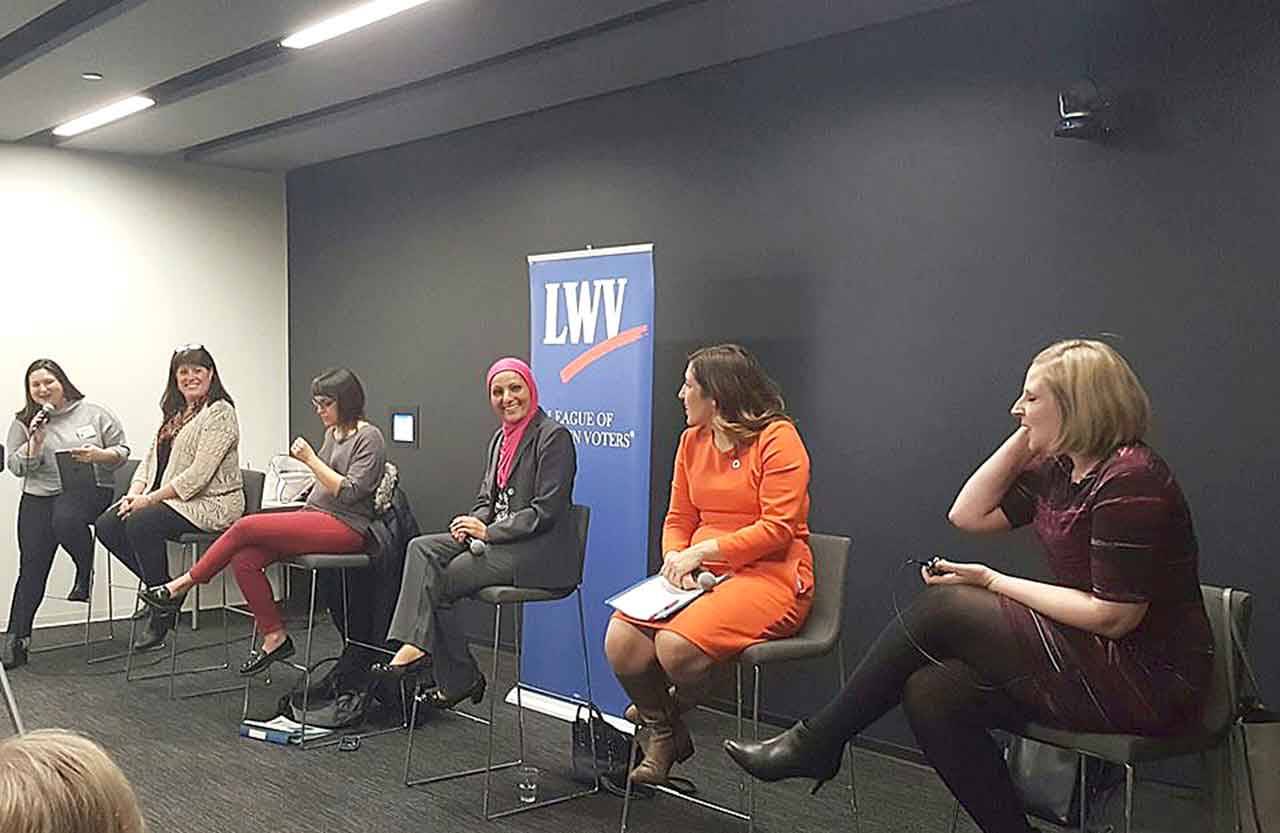The League of Women Voters (LWV) of Seattle-King County hosted a March Panel last week in Seattle with the most influential women in King County. In celebration of Women’s History Month, the panelists discussed their experiences as women in a traditionally male-dominated field, the power and importance of women’s voices in leadership roles, and how everyone can be more supportive of women’s success.
Representing the Eastside was King County Councilmember Claudia Balducci (District 6) and American Muslim Empowerment Network (AMEN) executive director, Aneelah Afzali (Redmond). Other panelists included The EverGrey co-founder and director Monica Guzman, Seattle City Councilmember Teresa Mosqueda, and Crosscut reporter Melissa Santos.
The five women who represent journalists, electives and activists shared with the audience their experiences as women and how they respond to sexism.
“For me, this recognition of being treated differently was in the double standards that I felt, saw, and experienced growing up,” Afzali said. “Specifically in the difference of treatment of little girls versus little boys and how we socialize people in certain roles and certain responsibilities.”
Afzali shared with the attendees the first time she realized the fundamental ways women were treated and viewed differently than men in society. She recalled hunching over at a young age to try and hide the features of her female identity amongst her male cousins because of the differences in treatment. Breaking down barriers, Afzali continued her education and pursued a legal career. She remembered experiencing the different treatment of women in a male-dominated profession compared to men.
She said it played “itself out in numerous different times and numerous different ways.”
In a Pew Research Center survey conducted in 2017, data showed that women in majority-male workplaces are more likely to report gender discrimination. Some 37 percent of women who said their workplace was mostly male, reported that they had been treated as if they were not competent because of their gender. Women who work in majority-male workplaces are most likely to experience repeated small slights at work than those who work mainly with women (27 percent v. 15 percent) or received less support than a male (24 percent v. 12 percent).
Seattle City councilmember Mosqueda said she didn’t realize nor did it occur to her until years later during the start of the #MeToo movement.
“Even as we get into these positions that try to fight for change, the system’s are still, I think, oppressing,” Mosqueda said after sharing her experiences.
Early in Balducci’s career, if she wasn’t respected or valued, she said she would “just walk away.”
“I realized that every time in my life that I felt I was in a position where I wasn’t being respected, where I wasn’t valued, where I was treated with misogyny, I left,” she said about the technique she would use upon receiving gender discrimination. “I would move on. I’d stay in the places where I was valued, where I was respected, and where I was treated well.”
Aside from the personal impact, Balducci said it affects the institutions that drive women away and preventing them from bringing their best everyday.
“[It’s] damaging in the terms of all the things we need to do collectively through our institutions that don’t get done because the talent, drive, and passion of women and people who work [in those places] aren’t valued or supported,” she said.
As for the future of women, Afzali said she is excited about what is happening across the nation. Changes have brought more diversity and inclusion in companies and equity.
“We all benefit when we can help each other. I see us as in this together and really trying to uplift everybody together, and that is the goal that I am constantly striving for,” she said. “I’m a big believer in putting the community and the cause ahead of individual ego and emotions. I see those manifestations of women, especially strong women helping strong women – [even] in moments of weakness being willing to do that and it’s inspiring in an everyday basis.”


